(Thanks in advance to Daniel Weinstein for his expert help with this story - and also to Dan Fortune of MuchoMusic!.)
The funny thing is that nobody really made a big deal of it at the time - two of the most celebrated instrumentalists and bandleaders in all of American music got together for a once-in-a-lifetime (make that twice-in-a-lifetime) collaboration, and everybody treated it as business as usual.
But it happened.
In 1945, both Duke Ellington and Tommy Dorsey were under long-term contract to RCA Victor; each had infinite admiration for the other. Lawrence Brown - easily Ellington’s longest-lasting and most iconic trombonist - famously described himself as a “Tommy Dorsey” man. (Though as trombonist Daniel Weinstein points out, their specific approaches to the instrument - even when playing similar kinds of ballad material, were very different.) Ellington, of course, was regarded by his peers in the big band business - as well as everybody else - as jazz’s greatest composer-arranger, bar none.

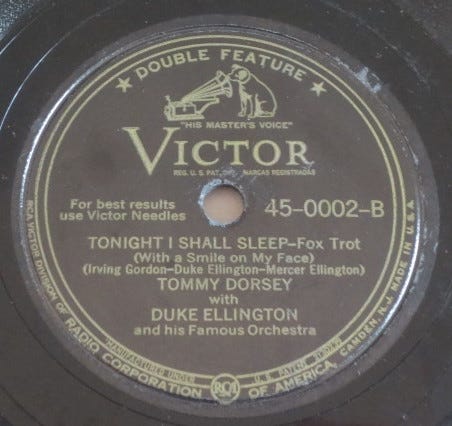
They got a chance to express their mutual admiration when, on May 14, 1945, RCA brought both bands in on the same day, and had each of the leaders guest star with each other. As it happened, neither tune was exactly new: both bands had been playing these songs for a few years during the war and the AFM ban, but this day represented their first chance to record them.
“The Minor Goes Muggin’” (Sy Oliver)
1942 War Bond Broadcast:
First (if the matrix numbers are in the correct sequence), Ellington played a feature piano solo on “The Minor Goes Muggin’,” a bluesy stomp written for Dorsey by his chief arranger Sy Oliver. The title seems to be a pun, referring to the Dorsey brothers being born and raised in coal mining country and also, obviously, that the piece is in minor. “Muggin’” was a swing-era slang term popularized by hot violinist Stuff Smith in 1936 Swing Street hit, “I’se a-Muggin’”; in Smith’s definition (courtesy Anthony Barnett), “Muggin’” means to vamp at the start of a song, to “Just vamp, vamp, vamp… [meaning] ‘I’m trying to think of something.’”
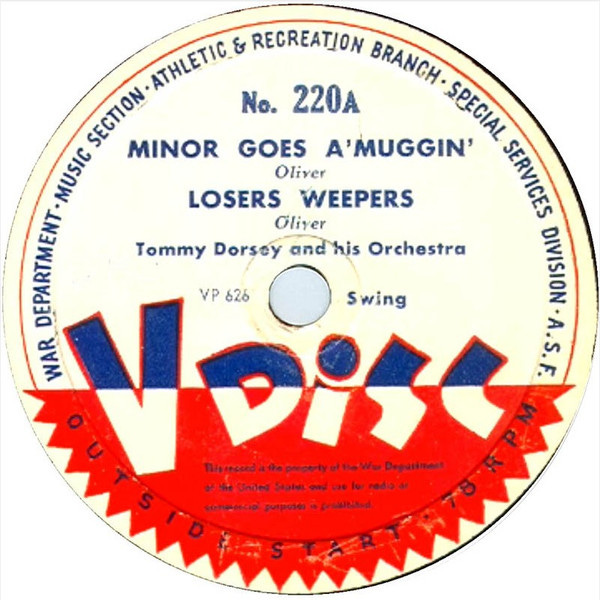
Dorsey had previously played “The Minor Goes Muggin’,” on a number of radio shows and recorded it for V-Disc. Both versions are propelled effortlessly - and sensationally - by the amazing Buddy Rich, in virtually the only opportunity he ever had to work with Ellington. The V-Disc version is fine, but the RCA recording is finer - Ellington’s angular piano adds a lot. (Dorsey’s regular pianist at that time was Jess Stacy - not too shabby!)
1945 Victor recording (with Ellington):
Dorsey’s guitarist, Bob Bain, later told Dorsey biographer Peter J. Levinson that the piece started in B flat minor and then modulated to F minor; the piano solo was supposed to be in F minor, but Duke insisted on playing it in B flat minor. When Bain later asked Ellington about this, he said he liked the sound of the two conflicting keys, and described the results as “kind of outside.”
With the help of Dan Weinstein, here’s a breakdown of the 1945 recording:
We start with an eight-bar piano intro by Ellington, full of his chord alterations based on ascending and descending minor seconds.
The first chorus is in B flat minor, except for the bridge in E flat minor. Oliver’s writing throughout seems very much like an homage to Duke. (He later told Billy May - who told me - that the entire style of the Jimmie Lunceford Orchestra, in particular the band’s unique time feel, was very much inspired by Ellington.) There’s growling plunger muted brass as played by the leader’s trombone, and then Gus Bivona plays some Johnny Hodges like alto sax in response.
Next comes an eight-bar interlude featuring Buddy Rich on tom-toms.
The second chorus features Duke’s solo chorus - which as Bob Bain remembered, is still in B flat minor. The piece then modulates dramatically to E flat minor, except for the bridge, wherein trumpeter Charlie Shavers solos in A flat minor.
Lastly, there’s an extended tag ending prominently featuring Ellington and Rich - as I say, this is the major occasion when they worked together.
“Tonight I Shall Sleep” (Irving Gordon - Mercer Ellington - Duke Ellington)
Live from a Treasury Show Broadcast (TREASURY STAR PARADE No. 233 (Transcribed In June 1943, NYC) featuring an uncommonly restrained - and very beautiful - performance from the legendary Ben Webster on tenor saxophone:
Another Treasury show broadcast, this one featuring both Billy Strayhorn and Al Hibbler and then Johnny Hodges:
The RCA Victor Recording with Tommy Dorsey
“Tonight I Shall Sleep” was a stunning Ellington ballad, co-credited to Mercer Ellington, with a lyric by Irving Gordon, who had earlier written the words to the Ducal standard “Prelude to a Kiss” (and would later write Nat King Cole’s hit “Unforgettable”) Ellington had performed this on many live broadcasts; it usually was a key feature for Al Hibbler, while the RCA Recording, of course, is reworked to feature Tommy Dorsey’s trombone.
Unbelievably, the jazz press was not impressed - although both papers pointed out that this was the sort of project more customarily offered by Decca Records, i.e., when Bing Crosby teamed up with Woody Herman or Xavier Cugat.
Metronome blasted both sides: “Tommy Dorsey plays the straight trombone solo for the trite melody offered by Duke's band on the first side. The double-feature idea produces nothing that couldn't have been done as well or better, musically speaking, by leaving it to the Duke's own Lawrence Brown. For the backing, Duke sits in on piano with the TD band on one of Sy Oliver's completely uninspired riff tunes. The pert, lively Duke chorus is the best thing in a generally noisy performance which has little more than a good beat and good recording in its favor. When is Sy going back to his old method of thinking before he writes?” Ouch!
DownBeat : “Minor [...] is the better side, mainly because the [Dorsey] band sounds more like Ellington’s than his own on the reverse side. …. [Dorsey] should have stayed home, for the Duke’s Lawrence Brown could have done much better.” Obviously, most contemporary listeners would disagree; Dorsey plays beautifully, and the whole point of the team-up was to hear Dorsey with the Duke’s band - and vice versa. Heard today, most of us would agree that both sides are swing era classics.
Coming Next: DORSEY MEETS THE DUKE, PART TWO - THE 1946 BROADCAST
Sing! Sing! Sing! : My tagline is, “Celebrating the great jazz - and jazz-adjacent - singers, as well as the composers, lyricists, arrangers, soloists, and sidemen, who help to make them great.”
A production of KSDS heard Saturdays at 10:00 AM Pacific; 1:00PM Eastern.
To listen to KSDS via the internet (current and recent shows are available for streaming.) click here.
The whole series is also listenable on Podbean.com; click here.
SING! SING! SING!
Ella Fitzgerald: "Ella's Race Problem" with Judith Tick
(BLACK HISTORY MONTH 2025-02-24)
download: <or> play online:
Nat King Cole: "We Are Americans Too" (“Assault on a King”)
(BLACK HISTORY MONTH 2025-02-18)
Download: <or> play online:
THE REAL AMBASSADORS with special guest Ricky Riccardi
(Black History Month 2025-02-17)
download: <or> play online:
The Don Redman Songbook
(SSS #135 2025-02-15 Black History Month)
download: <OR> play online:
Pioneering African American Female Songwriters w Dr. Michael Garber
(BLACK HISTORY MONTH - SSS #134 2025-02-08)
download: <or> play online:
“Strange Fruit”: Billie Holiday | Abe Meeropol | Earl Robinson
(BLACK HISTORY MONTH 2025-02-05)
download: <OR> play online:
Louis Armstrong: Satchmo's Race Problem (with Ricky Riccardi)
(BLACK HISTORY MONTH 2025-02-03)
download: <or> play online:
BLACK HISTORY MONTH: The Black Experience in WW2
(SSS #133 2025-02-01)
Download: <OR> play online:
Bobby Hackett Meets the Great Singers
(SSS #132 2025-01-25)
Download: or play online.
Salute to Fruit, Part 1 - Stealin' Apples
(SSS #131 2025-01-18)
download: or play online:
Get Happy! The Harold Arlen-Ted Koehler Songbook
(SSS #130 2025-01-11)
Download: <or> play online:
The Buzz! (Jazz Journalists Association)
Neal Tesser interviews Will Friedwald
Listen here.
Let's Have a Party! NEW YEAR’S PARTY SPECIAL
(SSS #129 2025-01-04 )
download: or play online:
Best of 2024 Jazz Vocals
(SSS #128 2024-12-28)
download: <OR> play online:
Dylan Goes Eclectic! Bob Dylan Jazz & Pop Mixtape w ELIJAH WALD
(SSS #127 2024-12-21)
Download: <or> play online:SLOUCHING TOWARDS BIRDLAND is a subStack newsletter by Will Friedwald. The best way to support my work is with a paid subscription, for which I am asking either $5 a month or $50 per year. Thank you for considering. (Thanks as always to Beth Naji & Arlen Schumer for special graphics.) Word up, peace out, go forth and sin no more! (And always remember: “A man is born, but he’s no good no how, without a song.”)
Note to friends: a lot of you respond to my SubStack posts here directly to me via eMail. It’s actually a lot more beneficial to me if you go to the SubStack web page and put your responses down as a “comment.” This helps me “drive traffic” and all that other social media stuff. If you look a tiny bit down from this text, you will see three buttons, one of which is “comment.” Just hit that one, hey. Thanks!
Slouching Towards Birdland (Will Friedwald's SubStack) is a reader-supported publication. To receive new posts and support my work, consider becoming a free or paid subscriber.
Slouching Towards Birdland (Will Friedwald's SubStack) is a reader-supported publication. To receive new posts and support my work, consider becoming a free or paid subscriber.





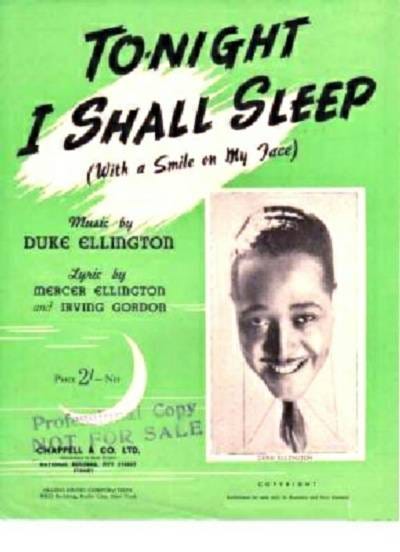
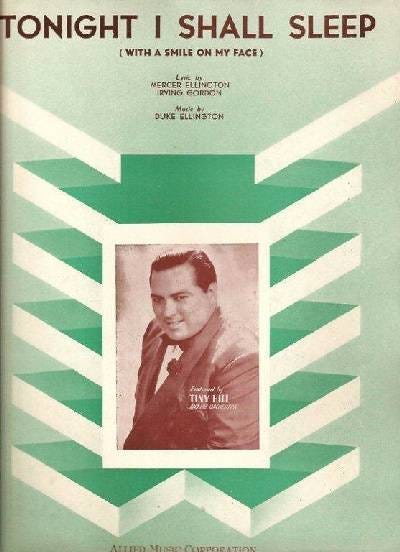
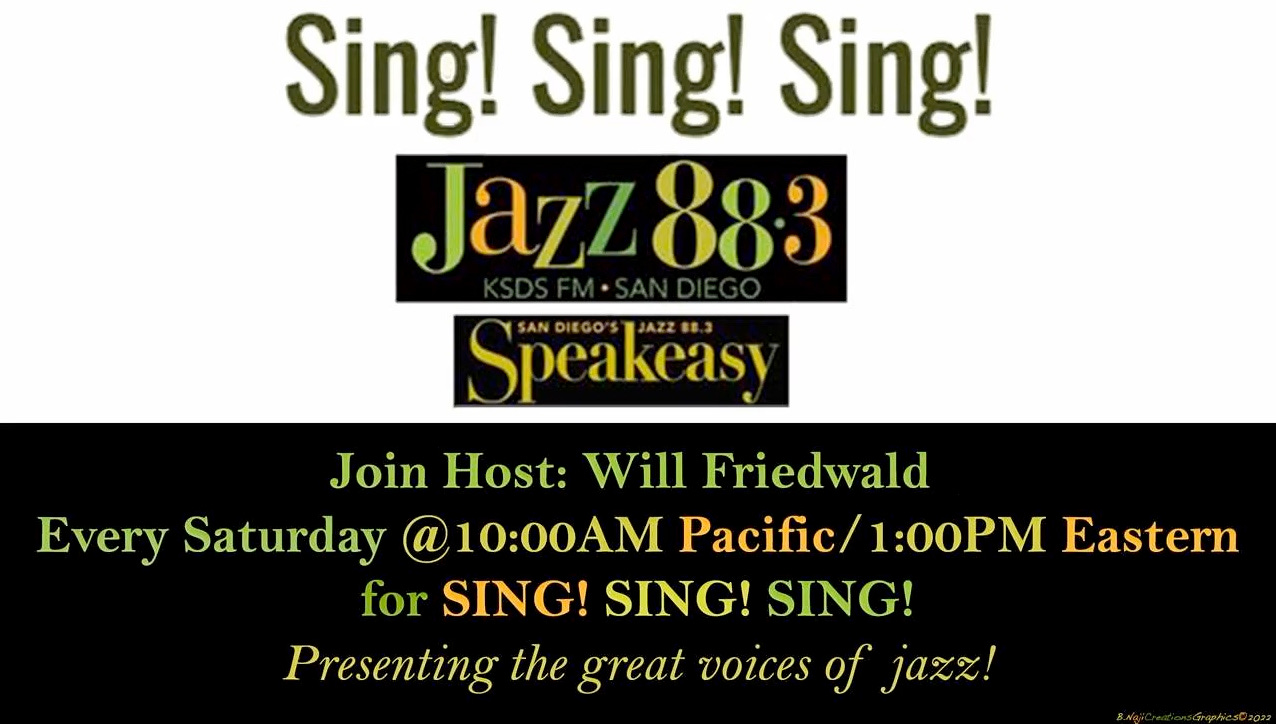
Did you want me to mess with this? If so, send it as usual, in an email to me....
For some great Lawrence Brown dig "Rose of Rio Grande"! Ellington had five wonderful trombone men.